OCCUPY CENTRAL - DAY 12: Full coverage of the day's events
PUBLISHED : Thursday, 09 October, 2014, 7:47am
UPDATED : Friday, 10 October, 2014, 5:57pm
Federation of Students leader Lester Shum has called on protesters to take to the streets on Friday at 7.30pm for a mass rally in Harcourt Road after Chief Secretary Carrie Lam called off talks on electoral reform.
Meanwhile, a formal complaint has been lodged with Hong Kong’s anti-corruption agency regarding chief executive Leung Chun-ying’s secret HK$50m deal with a listed Australian engineering firm.
11.30pm Causeway Bay: While talks about the future of the Occupy movement continue there's art in progress on Hennessy Road.
 Italian architect and painter, Francesco Lietti, brought a blank canvas yesterday to the streets that is rapidly being filled with the ideas of people on the streets. After an enthusiastic response yesterday, he decided to come back today. Dozens of people have joined him to paint during the past few hours.
Italian architect and painter, Francesco Lietti, brought a blank canvas yesterday to the streets that is rapidly being filled with the ideas of people on the streets. After an enthusiastic response yesterday, he decided to come back today. Dozens of people have joined him to paint during the past few hours.
Lietti says he felt "moved" by the Occupy movement that has spread across Hong Kong, and he aims to create piece that can symbolise events here.
11.15pm Admiralty: Speeches by protest leaders come to an end. However, it is estimated that at least 5,000 people are still gathered on Harcourt Road.
More protesters showed up in Admiralty on Thursday evening after the government suspended talks with the Hong Kong Federation of Students, but the situation remains peaceful.
 Winsome Ng, a third-year student from Baptist University says it was predictable for the government to cancel the talks originally scheduled for tomorrow.
Winsome Ng, a third-year student from Baptist University says it was predictable for the government to cancel the talks originally scheduled for tomorrow.
“From the very beginning the government has made their bottom line very clear - that Beijing would not retreat from their decision regarding the nominating committee, which left little room for a constructive talks with the protesters,” Ng said.
Ng added that it is the government, not the protesters, who have taken the occupation of Admiralty as a bargaining point in the dialogue. “The reason why we have taken to the streets was to call for dialogue.”
Her remarks were in response to Carrie Lam’s announcement earlier that the federation has hindered the basis for the dialogue by taking the “public interest” of other commuters as a bargaining chip.
Ng said she did not expect tensions to escalate again in Admiralty, where the police used tear gas on the crowd almost two weeks ago. “That strategy has been proven ineffective, and thus I don’t think the government will adopt the same approach again. But we will stay alert.”
10.45pm Admiralty: After the student leaders' speeches, Father Franco Mella comes on stage to show his support for the students. He says many people in the church still support the Occupy movement. His remarks came as Cardinal Joseph Zen pleaded a day earlier for students to retreat from the Mong Kok and Causeway Bay protest sites, and comments casting doubts on the effectiveness of the prolonged sit-in.
 10.40pm Admiralty: Speaking to supporters on stage in Harcourt Road, Lester Shum refutes Carrie Lam's claims that the number of protesters has been dwindling in recent days. Shum calls on the tens of thousands of Hongkongers who had participated in the Occupy movement to take to streets again on Friday at 7.30pm for an assembly in Harcourt Road - now renamed by protest leaders as "Umbrella Square". He also vows that the fight for democracy would last for a very long period of time.
10.40pm Admiralty: Speaking to supporters on stage in Harcourt Road, Lester Shum refutes Carrie Lam's claims that the number of protesters has been dwindling in recent days. Shum calls on the tens of thousands of Hongkongers who had participated in the Occupy movement to take to streets again on Friday at 7.30pm for an assembly in Harcourt Road - now renamed by protest leaders as "Umbrella Square". He also vows that the fight for democracy would last for a very long period of time.
Alex Chow, speaking on verge of tears, says Carrie Lam had created the political crisis by compiling a report to the central government that failed to reflect Hongkongers desire for genuine democracy. He also says the government has lost the legitimacy to govern after it used tear gas to suppress unarmed citizens.
"When the government lost the legitimacy to govern, how can the government accuse us of undermining the basis of dialogue when we are only peacefully appealing for the rights for true democracy?" Chow says. He also promises that students will explore ways to escalate their disobedience campaign, without giving further details.
10.30pm Causeway Bay: Ian Chan Kok-hin, external vice-president of the Hong Kong Federation of Students, describes the government's decision as "insincere". "The government is forcing the students and citizens to continue the occupation." He stresses that "occupying the roads is just one means of civil disobedience, but there are others".
Chan says that the Occupy movement, the Federation of Students, the Scholarism movement and other NGO's will launch another round of civil disobedience. "Boycotting the payment of government taxes" is one of the actions being considered, he says. "The government will have to listen the public."
Federation of Students secretary general Alex Chow Yong-Kang said student leaders were disappointed that Carrie Lam had used the students' remarks as "an excuse" to call off dialogue.
"Lam said we were making use of the dialogue to call for more people to take to the streets, when the number of protesters is diminishing ... But in fact it was a large crowd that could force the government to back down a bit. So, citizens should come back and take to the streets," Chow says.
He also dismissed suggestions that students' warning about a non-cooperative movement had ruined the chance for dialogue. "We were only saying that if the dialogue doesn't result in any progress, there will be such a movement, but officials said we had already started it," Chow said. "If the chief secretary was sincere, the dialogue would still be going on tomorrow."
Chow also emphasised that it was reasonable for the people to call for the national legislature to scrap its restrictive framework on political reform, and for public nomination. "The government has complete responsibility for this political crisis ... [Officials] should be working towards resolving this chaos and to clear up this mess," he added.
 9.50pm Causeway Bay: Protesters in Causeway Bay widely criticise the government's decision to cancel talks between officials and students. Sunny Cheung Kwan-yang,18, a university student who has been one of the most outspoken voices in the Causeway Bay occupation, says that the government's withdrawal is "unreasonable" and "ridiculous". He believes the decision will bring more people to the streets tomorrow. "We must keep up the Occupy movement," Cheung said.
9.50pm Causeway Bay: Protesters in Causeway Bay widely criticise the government's decision to cancel talks between officials and students. Sunny Cheung Kwan-yang,18, a university student who has been one of the most outspoken voices in the Causeway Bay occupation, says that the government's withdrawal is "unreasonable" and "ridiculous". He believes the decision will bring more people to the streets tomorrow. "We must keep up the Occupy movement," Cheung said.
Stella Chan,18, a university student and a volunteer who has been joining protests for about two weeks, described the government's decision as "irresponsible".
English lecturer Horace Li, 36, couldn't find an explanation for the government's announcement. "They are getting so irrational about it. If they want to resolve the issue, they have to open a channel of communication. I don't think that closing the door is a good idea," he says. Li also says the government is fuelling people's dissatisfaction with its actions. "People in the street are losing faith and hope in the government."
As a next step, Li suggests a new round of class boycotts by high school students could further put pressure on the government. "The people of Hong Kong are too gentle and polite in their striking".
 9.35pm: Shum says that the student group offered to meet the government in July but government representatives declined. Chow says the first time the government agreed to talks, the federation called them off, in the wake of violent attacks by suspected triads in Mong Kok.
9.35pm: Shum says that the student group offered to meet the government in July but government representatives declined. Chow says the first time the government agreed to talks, the federation called them off, in the wake of violent attacks by suspected triads in Mong Kok.
9.20pm: Hong Kong Federation of Students' Secretary-General Alex Chow Yong-kang says the government has not shown sincerity by cancelling tomorrow's proposed talks. The federation says it has always been sincere about starting a dialogue but the government has not been. Chow and Shum both accuse the SAR government of being responsible for the [Occupy] crisis.
The students' representatives say Carrie Lam wrote a terrible report to the NPC that led to its decision on August 31, and the government employed tear gas to attack protesters, which led more people to the streets.
Now the government refuses to take responsibility for the crisis it created and it doesn't listen to its own people, they say.
HKFS vice-secretary Lester Shum says the government had set no prerequisites for the talks, yet decided to cancel them anyway. Shum says the federation had only one prerequisite for cancelling talks with the government. They said that if there were any violent attacks on protesters, the dialogue would be axed.
9pm Representatives of the Federation of Students begin a press conference to brief the media on their response to the government's decision to call off talks. More to follow...
8.45pm Mong Kok: Protesters rallying at the Mong Kok occupy site criticise the government's decision to call off talks with student leaders tomorrow. Polytechnic University student Patrick Lau accuses the administration of lacking sincerity for a dialogue. "I did not expect the talks to go smoothly," he says.
Cherry Cheung, a researcher at a university, slams the government for delaying the talks and waiting for protesters number to dwindle. "If [the government] says stepping up the civil disobedience campaign is not constructive, calling off the talks is even less constructive," Cheung says.
8.35pm: The government's decision to call off tomorrow's scheduled dialogue with the Hong Kong Federation of Students was in response to recent remarks made by student representatives which “undermined the basis for a constructive dialogue”, Chief Secretary Carrie Lam Cheng Yuet-ngor tells the media at a press briefing.
The decision comes just hours after the federation announced another round of non-cooperation movements, in which they called on more citizens to join the Occupy protests if dialogue with the government failed to offer substantial changes to the city’s political reform.
Lam said such remarks went against the principles behind the planned talks, adding that when and whether or not the “illegal occupation” would end should not be used as a bargaining chip in the dialogue. Any discussion on reform should be within the framework of the Basic Law, Lam added, citing the other “principle” behind the talks.
“We regret to make such announcement as we know the public’s expectations for dialogue remains high,” Lam said. She added the government had not, and would not, set prerequisites for future dialogue, which could be resumed when student representatives showed an "equal sense of sincerity" towards constructive talks.
8.15pm: Reacting to the governments' decision, Chinese University Students' Union president Tommy Cheung Sau-yin says: "The government taking the initiative to call off the dialogue makes people doubt officials' sincerity."
Cheung continued: "I think the key is not whether there is a series of non-cooperative movements ... people will join that movement if they support it. But more people are looking at whether any progress can be made at the talks. If no progress is made, a lot of people would be disappointed and rejoin the occupation."
7.55pm: Lam says students have not met the basic conditions for dialogue to go ahead as planned:
“The talk is based on two conditions: First the discussion must be within the framework of the decision made by the National People’s Congress Standing Committee. Second it must not be linked to the Occupy movement. Unfortunately, the protesters rejected the rational proposal and went back to their old position.
"They now insist on public nomination and to abolish the decision made by the NPCSC. They also link the dialogue with the Occupy movement and even said the movement would last until the talks produce a result [they want]. This is sacrificing public good for their political demands, and is against public interests and political ethics.”
7.35pm: Carrie Lam tells a press conference that talks with students scheduled for tomorrow are cancelled after protest leaders called on members of the public to gather at Harcourt Road before the dialogue to put pressure on the government.
7.30pm: Principal economist Andrew Au Sik-hung, of the Financial Services and Treasury Bureau, warns the city’s economic growth could slow as the retailing and catering markets shrink amid the protests.
“Theoretically, if the revenue of tourism, retailing and catering industries drops 5 per cent, the city’s weekly GDP will lose HK$300 million,” he says.
7.25pm: Up to 12.5km of road was congested on Hong Kong Island during peak hours this morning, with the longest traffic jam stretching 4.8km from Aberdeen Police Station to Queen’s Road East, transport officials say.
Some 40 per cent of bus routes were affected, with 22 routes suspended and another 227 changed. Twenty-seven minibus routes were also affected. The tram linking Western district to Eastern District remains paralysed.
As kindergartens reopened today, more than 70 per cent of school buses in Wan Chai were 30-50 minutes later than scheduled. In Central and Western district, more than 90 per cent of kindergartens saw pupils late for school.
7.20pm Causeway Bay: An elderly man who has been visiting the Causeway Bay site since its first day of occupation, September 29, returns today holding the same banner. It reads "Occupy Central is a battle, and one should not fear those in power, because the warrior is sure to win."
 Wong Pak-lam, 81, a retired surgeon, says that his main motivation is to show support to students. "Real democracy is when the candidates are not pre-selected and local people can choose their leaders," Wong says. He says he will go to the Mong Kok protest site later tonight and then to Admiralty tomorrow.
Wong Pak-lam, 81, a retired surgeon, says that his main motivation is to show support to students. "Real democracy is when the candidates are not pre-selected and local people can choose their leaders," Wong says. He says he will go to the Mong Kok protest site later tonight and then to Admiralty tomorrow.
Meanwhile, an English class finishes and another volunteer is now running a class about economics on Yee Wo Street.
7.15pm: Representatives of the police, district councils and the transportation industry say negotiations with protesters to remove barricades from roads are yet to yield a positive outcome.
Protesters have refused to retreat from Admiralty, which they say is their major bargaining chip, says home affairs department director Pamela Tan Kam Mi-wah, who took part in negotiations earlier today.
Police say they have tried to explain to protesters that their occupation is having an extensive impact on the daily life of members of the public, says Steve Hui Chun-tak, chief superintendent of the police public relations branch. “Unfortunately they turned down our proposal … It is extremely irresponsible for them to do so,” he says.
Hui says that police will keep negotiating but will not rule out taking "appropriate actions” when necessary.
Hui adds that police fear tensions could escalate in Mong Kok as protesters prepared for a prolonged demonstration. “We noticed some beds had been set up in the area,” Hui says, adding that the site remains a “high-risk area” [of conflicts between protesters and the anti-occupation rally].
7.10pm: A spokesman for the Department of Justice says it has authorised Director of Public Prosecutions Keith Yeung Ka-hung to handle the complaint to the ICAC about CY Leung’s secret £4 million (HK$50m) deal with a listed Australian engineering firm.
Yeung has been given the authority to decide whether a prosecution is warranted.
READ: Hong Kong anti-graft agency receives complaint about CY Leung's HK$50m deal
6.52pm: Meanwhile, in Mong Kok, protesters are playing table tennis on Nathan Road.
You’d have to see it to believe it, so here’s photographic evidence …
6.45pm: Chief Secretary Carrie Lam Cheng Yuet-ngor will hold a press conference at 7.30pm.
She'll be joined by Secretary for Constitutional and Mainland Affairs Raymond Tam Chi-yuen.
6.35pm: Protest leaders meet protesters in Harcourt Road – the so-called “Umbrella Square” – after the press conference.
The group includes Occupy’s Benny Tai Yiu-ting, representatives of the Federation of Students, Scholarism and pan-democrats. Some 200 protesters come forward to show their support.
6.30pm: Alan Leong also says the pan-democrats will call for CY Leung’s impeachment.
"We are gathering the evidence and working on the draft. We will move the motion in the Legco when the draft is ready," he says.
6.25pm: Pan-democrats say they will frustrate the government in Legco ...
Civic Party leader Alan Leong Kah-kit says pan-democratic lawmakers will block financial applications from the government in the two subcommittees under the Finance Committee, except urgent and non-controversial items related to livelihood issues.
Pan-democrats have grabbed control in the public work subcommittee and establishment subcommittee under the powerful Finance Committee in the Legislative Council.
6.15pm: More from the protest leaders’ press conference …
Pan-democrats and protest leaders call on members of the public to gather at Harcourt Road – which they have renamed “Umbrella Square” – on Friday afternoon when dialogue between students and government officials takes place at 4pm.
Alex Chow Yong-kang, secretary-general of the Federation of Students, says students are sincere in having dialogue with Chief Secretary Carrie Lam Cheng Yuet-ngor, but they have yet to hear a response from the government about the venue and related arrangements.
He warns that protests will continue until the government has responded to their demands and provides substantial solutions to ease political tensions. They say they will consult the public before deciding whether to retreat in future.
Joshua Wong Chi-fung, convenor of student activist group Scholarism, says they might mobilise another class boycott in secondary schools if the government fails to respond to their core demands – including the retraction of Beijing’s restrictive framework on universal suffrage and the resignation of Chief Executive Leung Chun-ying.
The groups say they will coordinate their efforts in escalating the disobedience and non-cooperation movement. However, they say they have no plans to formalise their alliance.
5.45pm: A new generation of journalists is covering the protests …
5.35pm: A coalition of groups representing truck drivers sets the protesters a Wednesday deadline (October 15) to take down the barricades.
"We can send trucks to clear the barricades," says Stanley Chiang Chi-wai, chairman of the Lok Ma Chau China-Hong Kong Freight Association. "We would do this first, but we don't want to. We want the protesters to think about the greater good of Hong Kong."
The representatives stress that the roadblocks are taking a toll on the livelihoods of truck drivers all over Hong Kong.
Tse Long, chairman of the Hong Kong Guangdong Transport Association, estimates drivers have had to work an extra two hours each day and spend an extra HK$1,000 on petrol over the past two weeks because of the road blockades.
Tse and Chiang stress they want the protesters to leave peacefully by October 15 to avoid any clashes, but won't rule out informing police of their plans before clearing the barricades themselves.
"We have a lot of gear," Tse says. "When I drive my truck in the street and I push away the barricades, do you dare destroy my truck? Are you trying to pick a fight?"
Tse says they have access to trucks with portable cranes, for one. Chiang insists they are politically neutral and no strangers to protests themselves.
"We want to talk, before we take action," Chiang says. "We protested with roadblocks ourselves back in 2007 but we were only there for two hours."
5.25pm: Protest leaders from the Federation of Students, Occupy Central and pan-democrat lawmakers are speaking at a press conference now.
They have called on members of the public to meet at Admiralty at 3.30pm tomorrow to put pressure on the government ahead of negotiations with Carrie Lam scheduled for 4pm.
Student leaders also threatened to organise more secondary school strikes if the government does not meet their demands
More to follow …
5.15pm: How did Occupy Central’s pro-democracy push begin? Our interactive timeline traces how a fringe movement became a full-blown Umbrella Revolution.
4.45pm: Some100 people are occupying the protest area in Causeway Bay near Sogo department store. An ad-hoc library made of recycled materials has been set up on Hennessy Road.
People can borrow books and DVDs or leave another in exchange. Volunteers have also drawn a map titled "Support Democracy, Support Causeway Bay", marking the location of local restaurants in the area.
4.30pm Admiralty: With fewer protesters gathering in Admiralty, there has been fierce debate on whether to remove some barricades to improve access to the area. Josephine Yan, 40, says she would agree to this if the government responds to protesters' demands, but acknowledged that the situation was currently in stalemate. "It really depends on the conditions. The government has not reopened the Civic Square for us. I think now it is really about making exchanges," she says.
Wong Kwan-ho, 22, says that he couldn't see how reducing the size of the protest area would help. "I think other people have already got used to the transport arrangements now, and there are fewer private vehicles on the roads," the IVE graduate says.
 However, other protesters' attitudes have softened. Connie Ho, a university student, says it would be no problem to reduce the size of the area, so long as the barricades remain, "If we remove the barricades, then it is no longer a non-cooperative movement. What we have now is a bargaining tool with the government," Ho says, "If we step back, the government will be more aggressive."
However, other protesters' attitudes have softened. Connie Ho, a university student, says it would be no problem to reduce the size of the area, so long as the barricades remain, "If we remove the barricades, then it is no longer a non-cooperative movement. What we have now is a bargaining tool with the government," Ho says, "If we step back, the government will be more aggressive."
4pm: Financial Secretary John Tsang Chun-wah says police and students have been “highly restrained” over the past couple of weeks during the protests, displaying “common core values that all Hong Kong people subscribe to”.
“The government will do our best to bridge the divided community at this difficult time and build consensus that would enable us to take a giant step forward towards the achievement of universal suffrage in 2017 for the election of our next chief executive,” Tsang said in a speech to the Boston Economic Club in Boston on Wednesday night.
“We do not underestimate the difficulty in this immense task. We have not seen such serious confrontations for half a century. A few people were injured but luckily nobody suffered serious harm. No broken windows, no scratches on vehicles, no arson, no looting – quite typical of such actions in Hong Kong. Both the police and protesters have been highly restrained, displaying the common core values that all Hong Kong people subscribe to.”
3.10pm: Time for a siesta? Protesters in Mong Kok have set up beds on Nathan Road for passersby to take a rest.
People are seen sitting on the beds reading, chatting and using laptops.
3pm: More on CY and the NeoDemocrats:
A formal complaint has been lodged with Hong Kong’s anti-corruption agency regarding the chief executive’s secret £4 million (HK$50m) deal with a listed Australian engineering firm.
The complaint, lodged by representatives of the pro-democracy NeoDemocrat party, could lead to an Independent Commission Against Corruption (ICAC) investigation of the deal, revealed by an Australian newspaper on Wednesday.
READ: Hong Kong anti-graft agency receives complaint about CY Leung's secret HK$50m deal
2.45pm: Opinion is divided among the remaining few protesters in Admiralty about whether to remove some barricades in the area.
Josephine Yan, 40, says she would only agree if the government responds to the protesters’ demands. "It really depends on the conditions. The government has not reopened Civic Square for us ... I think now it is really about the exchangeable conditions," she says.
Wong Kwan-ho, 22, says he is against removing barriers. "I think other people have already got used to the transport arrangement now ... and there are fewer private vehicles," the IVE graduate says.
However, some protesters' attitudes have softened. Connie Ho, a university student, says it is all right to taken down some barricades to reduce the size of the blocked area. "If we remove the barricades, then it is no longer a non-cooperative movement. What we have now is a bargaining tool with the government," Ho says.
2.30pm: Members of the NeoDemocrats protest at the Independent Commission Against Corruption headquarters in Quarry Bay. They are demanding an investigation into the alleged undisclosed payment of HK$49.9 million from an Australian firm that Chief Executive Leung Chun-ying received but failed to disclose upon assuming office.
The NeoDemocrats are a group of current and former members of the Democratic Party, seen as more radical than the party itself following its compromise with the government on electoral reforms for 2012.
2.10pm: A small group of dissenters stops by the Causeway Bay barricades to tell protesters they should take their demonstration 2,000 kilometres north.
"It's no use protesting here; do it in Beijing," says a man in a white shirt and black trousers. "You need to put pressure on the central government."
Some passersby mumble their approval and tell the students to clear out. After a while, the protesters decide not to debate the issue any longer.
Most of the policemen who were here this morning have left.
2pm: Protest leaders announce they will hold a press conference at 5pm to outline a “new wave” of the Occupy civil disobedience movement.
The press release does not say if talks scheduled for tomorrow between the students and Carrie Lam have broken down. More details as soon as we get them.
1.45pm: Some photos just in from the main protest site near government headquarters in Admiralty …
1.30pm: Here's an interactive map of the barricades. Click for photos.
1.15pm: Federation of Students member Lai Choi-yin, 22, has been at the Causeway Bay protest site every day since last Wednesday. Although she spent last night here, she usually goes to the Admiralty site at midnight to help with supplies.
“We're not hoping that the talks tomorrow can resolve everything. We know it's a long process and may take several negotiations,” she says.
“If the government doesn't talk to us about discussing civic nomination in detail in a report to the National People's Congress, I think we have to talk to all the protesters before we consider reducing the barricaded areas.
“Look at how long protesters occupied Wall Street. I'm prepared to be here for a while, but I think the government is counting on people's enthusiasm waning or playing a war of attrition. It may have worked on some people, but that just goes to show that we have to make sure everyone understands why we're doing this.”
1pm: Wong Ka-fai, 21, vice chairman of the Chinese University of Hong Kong Student Union, has stopped by the Causeway Bay protest site every day since last Wednesday and spent last night there.
He says he has tried to explain to local residents the protesters’ reasons for staying.
“Not having a lot of people doesn't mean this site isn't important. That actually means we can take the time to talk to local residents and explain why we're doing this,” he says.
“I'm talking about the people who don't get why students and workers ignore their classes and jobs just to get in the way of traffic and local businesses. I tell them that ‘yes’, we have an affect on business, but the repression from the current regime has a far greater affect on our lives.
“I don't know if I've managed to convince anyone, but at least I imagine they feel a little better knowing that we're not just causing trouble for no reason.
“Whether or not we reduce the size of the protest area lies with every protester, but more importantly, it hangs on how the government responds to our demands. That's what matters. We don't want to be here, but if the government doesn't take us seriously and jerks us around, then they're practically encouraging us to stay here.”
12.30pm: Red minibus drivers hold a press conference in front of Sogo in Causeway Bay. They demand an end to the barricades, which they call illegal.
"This road is a lifeline, an artery for minibuses in Causeway Bay," says Chan Fung-yuen, the public light bus branch director of the Motor Transport Workers General Union. "We drivers have elderly and young family members at home to feed. We hope the protesters will stop imposing their struggle on all Hongkongers."
Chan says that the drivers have lost 75 per cent of their business, while still having to pay for petrol and the rent of their vehicles. He says their business is "on a saline drip."
At the end of the press conference, the drivers chant a slogan that calls the protests "mob politics" and demand the police and government step in to "strike back against these protesters who knowingly defy the law." Chan gives a police representative a letter from the union.
12.15pm: There’s a greater police presence in Causeway Bay today, according to one of our reporters in the area.
“I must have passed at least 30 policemen [this morning],” says the Post’s Alan Yu. “I asked one officer and he said these are routine patrols. There definitely weren't that many here yesterday. One protester stopped me to ask what was going on.”
12.05pm: Two men show up at the protest site in Mong Kok, screaming that the protesters should go to occupy a landfill or the home of the owner of Apple Daily.
“If you want to occupy, go to Tseung Kwan O landfill. Go to Jimmy Lai's home," one of the men shouts.
“Some small shops in Mong Kok are losing HK$5,000 in revenue a day."
Another man asks the students to stay away from politicians because they will hijack the movement. Police officers finally interrupt and the two men leave with their supporters.
11.55am: The Australian firm at the centre of a storm over an multimillion-dollar payout to Leung Chun-ying has just released a statement. Leung, who worked with the firm before he became Hong Kong's chief executive, allegedly failed to disclose a HK$50 million payment from engineering company UGL Limited. The leader is facing questions over possible misconduct in relation to the contract.
However, in an October 9 statement, UGL defended both the deal and the decision not to declare it. It said the contract was a normal business arrangement, made after it acquired in December 2011 the subsidiaries of Leung's former employer, DTZ Holdings.
UGL said the payment to Leung was made in relation to "non-compete, non-poach and DTZ senior management retention provisions" after it acquired subsidiaries of DTZ. Leung founded DTZ's North Asia business and used to serve as its CEO, before he resigned in November 2011, according to UGL.
"Such agreements are common confidential commercial arrangements when a business is being acquired. The only difference here being Mr Leung went on nearly six months later to become the Chief Executive of Hong Kong," the Australian firm said in the statement.
It insisted that the agreement with and payment to Leung were necessary for commercial reasons, and that it was under "no obligation, legal or otherwise, to disclose the agreement".
"It should be noted that at the time of entering in the agreement, Mr Leung was not an elected official of Hong Kong, and UGL had no reason to expect that his campaign for Chief Executive of Hong Kong would be successful," UGL said.
Stay tuned to scmp.com for the full story.
UGL also said that the deal with Leung covered only the two years after UGL's acquisition of DTZ subsidiaries.
In those two years and afterwards, "UGL did not request Mr Leung to undertake any task whatsoever on our behalf, nor did Mr Leung offer to perform any tasks. Our only concern was to see the non-poach and non-compete enforced and the value of the acquisition protected, which it was," it said.
11.25am: Students are reportedly considering reducing the number of blockades or at least open part of the road to ease the traffic situation, including opening Queensway so that trams can start operating in that area, according to a Ming Pao report.
The Federation of Students, one of three main groups leading the protests aside from Scholarism and Occupy Central, was quoted as saying it would appoint representatives to negotiate whether to cut the number of barricades. The federation said it would strive to reach a consensus with protesters on the matter.
10.43am: There are about 60 to 70 protesters in Mong Kok, where it's calm. In one section of road, youths are seen relaxing in a makeshift encampment, with tarps overhead, a few tents on the ground and small stools that some use as tables. There are just eight police officers on duty.
In Causeway Bay, there were fewer people - at least 30, according to a reporter's estimate - almost as many as the 20 to 30 police officers standing guard. One office said these were routine patrols.
10.25am: Here is today's cartoon by Harry Harrison on Occupy Central.
And don't miss Alex Lo's latest column, in which he argues that the pro-democracy protests have exposed to the world a gnawing problem in the city: extreme inequalities in education, job opportunities and social mobility. He argues that the city is confronting not merely a political crisis but a generational one, fuelled by social discontent that should spell trouble for the ruling elite.
READ: Hong Kong protests expose the real rot in society
9.50am: Cardinal Joseph Zen, former leader of the Hong Kong Catholic Church, told students today that it would be "stupid" to continue the sit-in protest when nothing could come of negotiations with a government that has "gone crazy", RTHK reported.
Zen, who sympathised with the movement and early in the protests called for CY Leung to step down, said the demonstrators needed to conserve their energy instead of exhausting themselves while "not hurting the administration", the report said.
9.33am: How do some parents feel about the continuing Occupy protests? The Post spoke to some at True Light Kindergarten in Central, where children arrived between 15 to 40 minutes late. Classes were supposed to start at 9am.
May Wong, mother of four-year-old: "It hasn't affected our child's education much. There's not much to do at school apart from play. She's just been playing at home. I supported Occupy Central at first, but now that it's been more than a week, I think it's dragged on for too long.
"I think they've achieved all they can, and they won't accomplish much more by staying, though they're certainly making life inconvenient for a lot of Hongkongers. They've sent a very clear message to the government and the rest of society that they want genuine universal suffrage."
Tsai Hong-Ming, 38, father of a five-year-old: "The past two weeks have been a little inconvenient because we had to get someone to take care of our child at home. My wife usually works but she had to take two weeks off to stay home. I don't really approve of what Occupy Central protesters are doing. This relatively small group of people has disrupted most people's lives by protesting in a way that's irrational and illegal. No matter how noble their aspirations are, they have to choose their strategy carefully. They can't just do anything."
Wong Chui-ling, in her late 30s, mother to a three-year-old: "I had to keep taking my child outside; it's harder on the parents. I happen to be pregnant right now, so it's been particularly hard to take my child out. I brought her to the park, to the library, but we spent quite a bit of time at home.
"The protesters are thinking too much about themselves. A lot of Hongkongers have had their work and school lives disrupted because of the movement. My husband usually takes a bus to work in Wan Chai. For the past two weeks, he's had to drive through the hills or walk down to Central to get public transport."
9.17am: Director of Administration Kitty Choi Kit-yu said operations at the government headquarters (CGO) have not fully resumed as there are still roadblocks around the complex. Choi said visitors and officials from other government departments were finding it more difficult to enter the Tamar complex for meetings. "Our efficiency is still being hindered," Choi said.
Betty Fung Ching Suk-yee, the permanent secretary for home affairs, told reporters before walking into work at the headquarters that the biggest inconvenience now was going out for meetings during the day.
"I hope the road will be reopened again and the entire operation will be better," said Fung. She said some district councillors from Central met protesters and urged them to open the roads in Admiralty.
Dennis Yeung, a civil servant working in Tamar, said he had to spend an extra 30 minutes to reach Admiralty today by bus. But he was satisfied to see the blockade was moved to allow a two-metre-wide passage on the footbridge. "They [protesters] have their own needs, it is fine as long as they don't affect our lives," he said.
8.50am: There's a camping atmosphere in Admiralty, where people are starting to wake up from a night spent sleeping on yoga mats, blankets or even towels, with their rucksacks as pillows. In one corner, a man has started strumming his guitar and singing. People have also propped a cluster of umbrellas on the street, forming a buffer around a group of protesters who are eating and chatting to each other.
In Causeway Bay, the scene was more placid, with just around 15 to 20 people camped out there.
8.37am: Traffic disruptions continue today, with the Transport Department urging commuters to plan for longer travel times, especially as kindergartens in Wan Chai, Central and Western districts resume classes today.
Lam Lai-fan, the principal of True Light Kindergarten on Caine Road in Central, said around half their pupils come from other areas, including in Wan Chai and the Eastern district.
The kindergarten is prepared to see latecomers as the students need school buses, which also have to drop off primary and secondary school students - whose classes resumed earlier in the week.
Twenty-five bus routes remained suspended while 140 remain diverted on Hong Kong Island as some routes in Admiralty are still blocked. Some 70 bus routes in Kowloon and the New Territories are temporarily diverted, and another 74 cross-harbour routes are also diverted. Click here for the full story
Meanwhile, MTR authorities noted service disruptions on the Kwun Tong and Island lines due to overcrowding at Kowloon Tong and Sheung Wan, respectively.
8.27am: Kindergartens in Wan Chai, Central and Western districts reopen on Thursday. One of the parents taking their children back to kindergartens is Michael Wegener, 39, who says the protests had been more important than his son missing kindergarten for several days.
"At this age, I think he's fine," Wegener says, referring to his four year-old son. "But of course, the parents had to pay the school fees, the bus fees and the canteen fees. We continued to work, we had a nanny at home.
"I thought it was good, very healthy to show unhappiness about China not sticking to its promises," he says.
8am: Protesters wake up after another night on the streets of Admiralty as barricades are left unguarded.
Around 100 protesters are staying put along Harcourt Road. Barricades on the bridge connecting Admiralty Centre with the Tamar government offices have been almost completely removed, while the section between Citic Bridge and the government offices remains blocked by barricades.
Demonstrators have not tried to block people working at the government offices from going to work. A two-metre wide passage between Admiralty Centre bridge and the government offices allows staffers to pass unimpeded.
7.35am: Dozens of bus routes have been suspended as pro-democracy protesters continue to block major roads in Admiralty and Mong Kok.
7.30am: Here's a look at the Post's front-page on Thursday:
7.15am: Excerpts from the Post's coverage of the Occupy movement in our print edition on Thursday:
The media mogul spoke after a new batch of his confidential documents were leaked to the media on Monday - the third such disclosure since July. The documents suggested that Lai had sponsored Occupy.
Auxiliary forces were being called up more frequently, with an extra 60 to 80 officers stationed in Wan Chai, Central and Mong Kok each day.
The managing director of the LifeABC tour company filed the case at the Small Claims Tribunal at the Wan Chai Law Courts yesterday, seeking HK$450 in compensation from Tai.
You told me shop owners and commuters suffered… | But when I asked if you have ever gone on the street | You said it's enough to watch TVB news from dawn to dusk.
While tents and loudspeakers came from various non-governmental groups, other items - including goggles, masks, water and food - came from a number of secret donors.
Hunger striker Benny Mok Siu-man urged the organisers to form a committee to set priorities.
Without a government policy shift, after the demonstrations have ended, we will have to rely on our memories of the protest days for what clean vehicles on our roads mean for air quality.
7am: The front-page headlines of major local newspapers on Thursday:
Apple Daily: C Y Leung secretly pockets HK$50 million, fails to declare payout, also suspected of breaching bribery laws
Oriental Daily News: Animal feed oil passed off as edible lard
Ming Pao: Leung fails to declare deal in which he received HK$50 million from Australian company
Sing Tao Daily: Massive traffic jams across Hong Kong Island and Kowloon. Voices of discontent heard everywhere
6.45am: Here's a summary of what happened overnight:
* Preparations for the dialogue between Chief Secretary Carrie Lam Cheng Yuet-ngor and student representatives appeared to take a step backwards as the two sides squabbled over the agenda.
* Hundreds of people converged at the protest sites in Mong Kok and Admiralty in the night to Thursday, debating the future of the pro-democracy movement and its impact on the territory's economy. Many just enjoyed walking on the usually congested roads.
* No major confrontations between critics and supporters of the Occupy movement occurred. Police did not attempt to clear protest sites.
http://www.scmp.com/news/hong-kong/article/1612602/live-democracy-advocates-urge-unity-occupy-movement-enters-12th-day
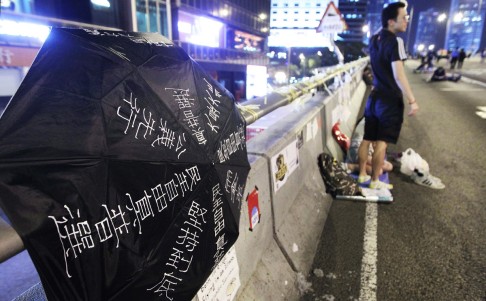
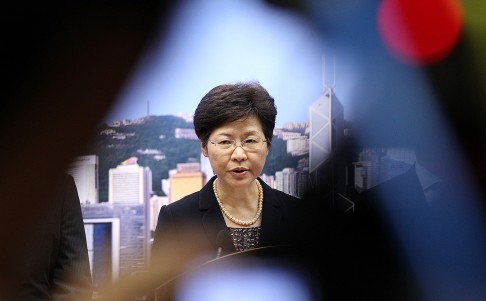
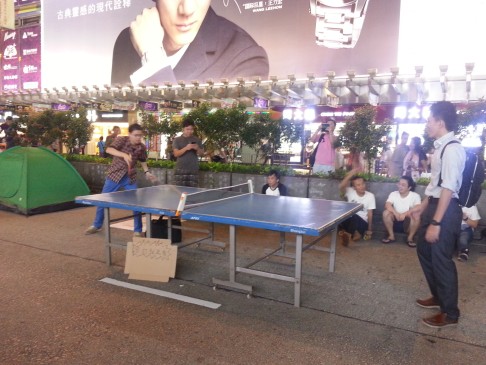
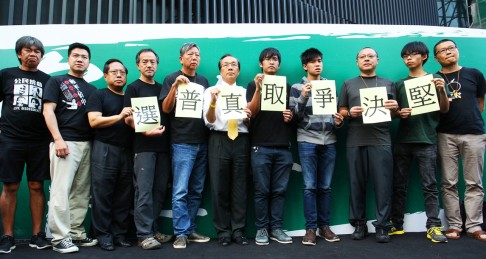
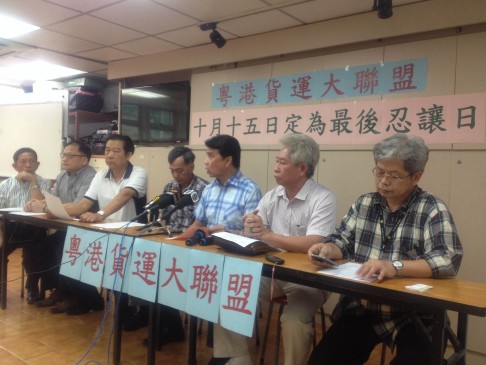
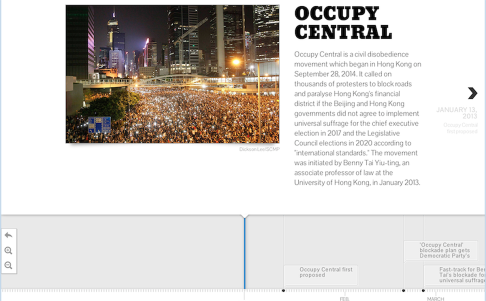
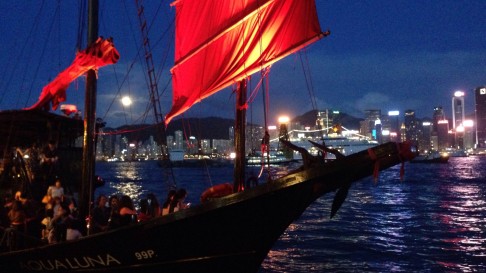
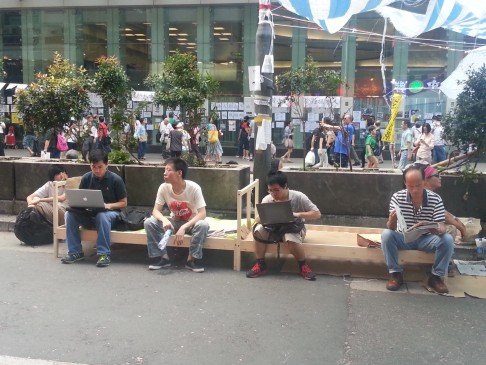
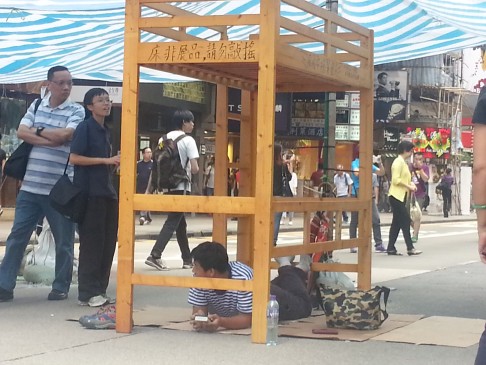
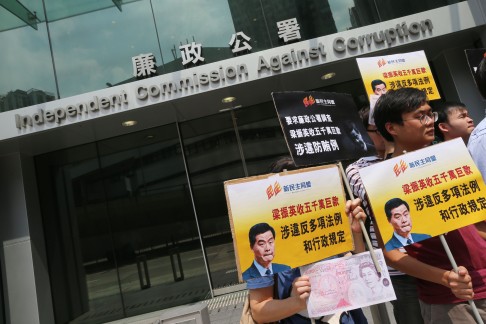
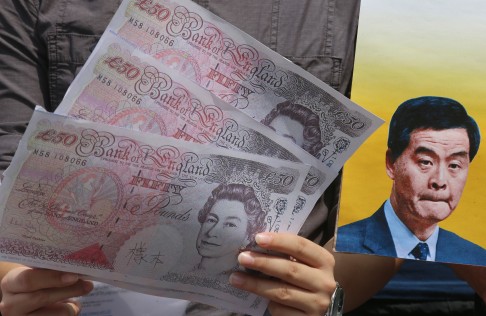
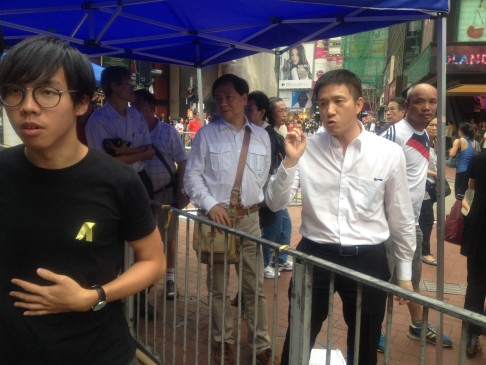
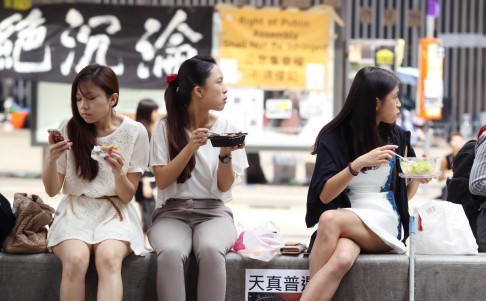
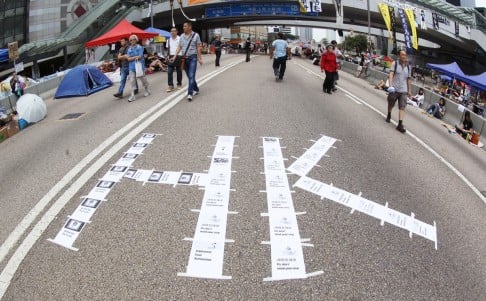
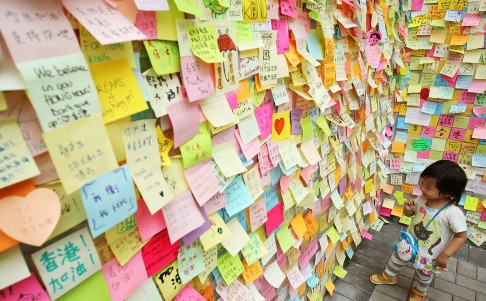
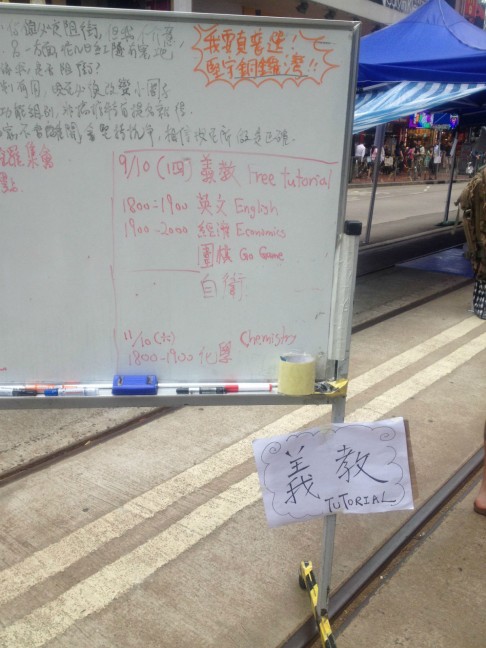
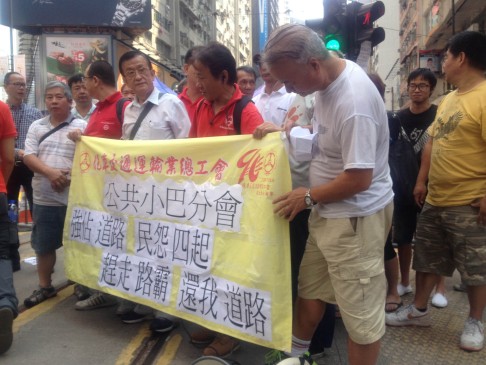
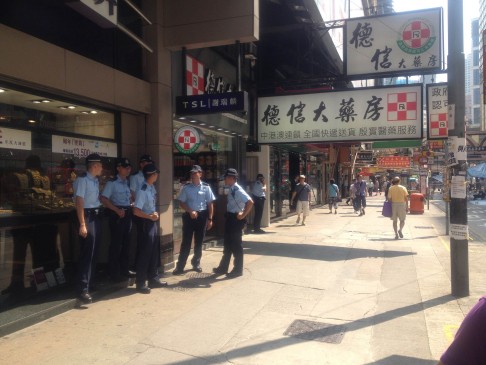
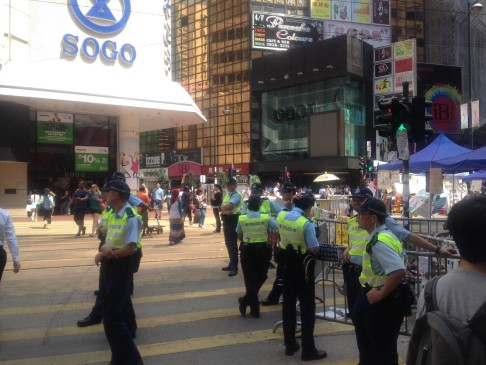
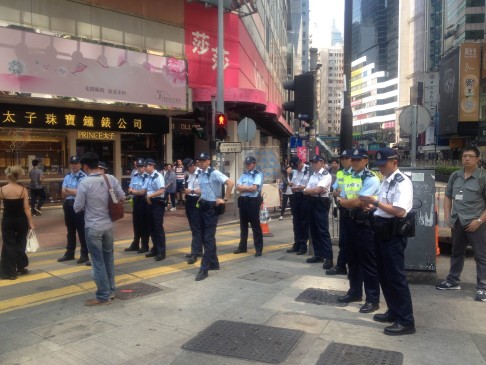
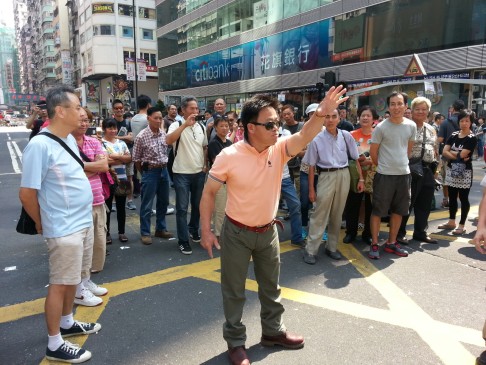
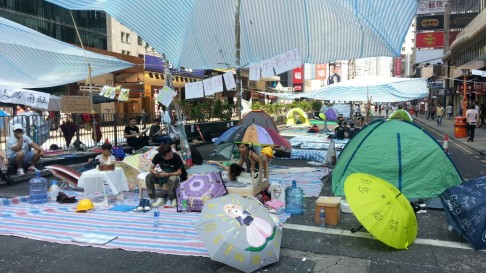
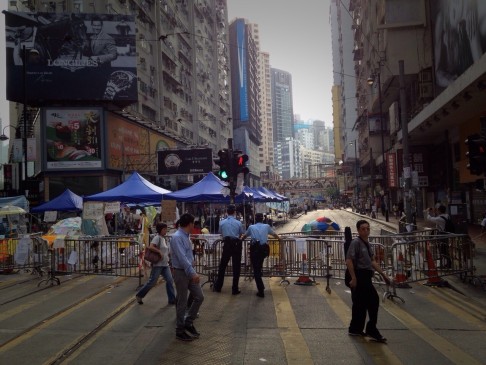
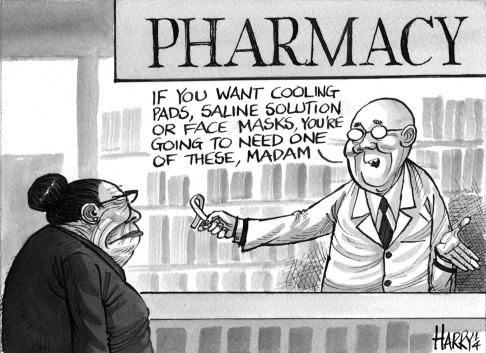

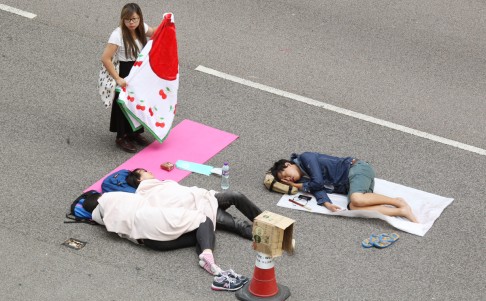
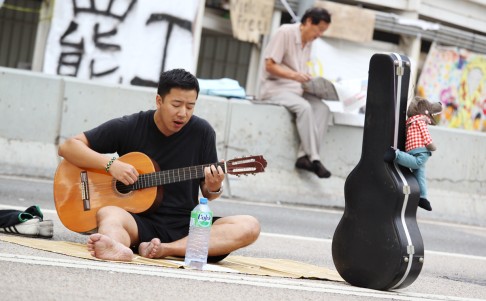
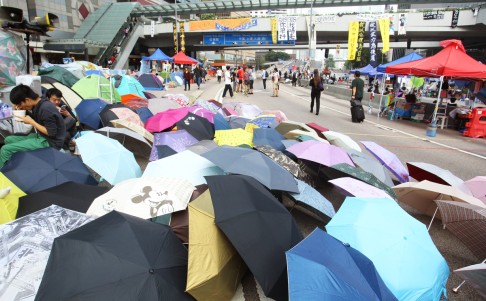
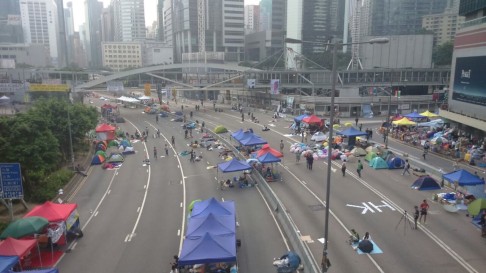
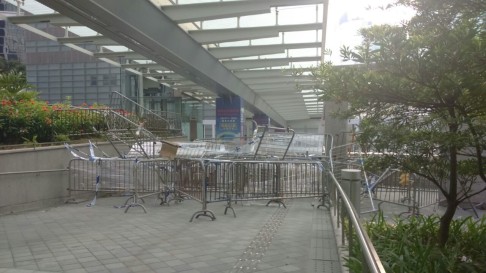
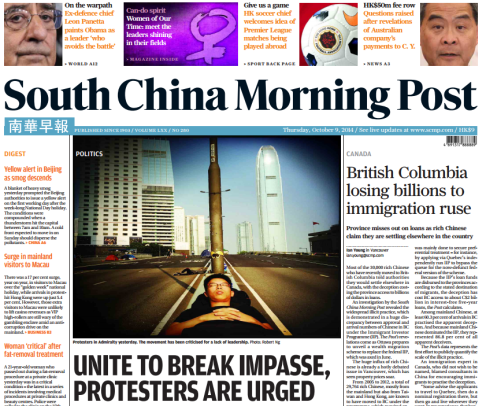
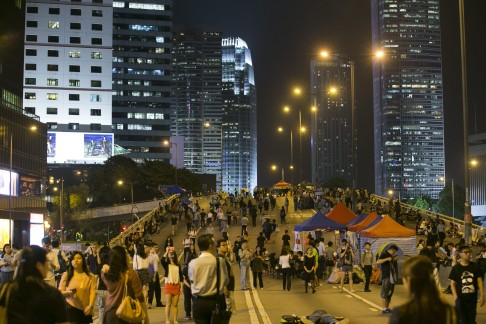
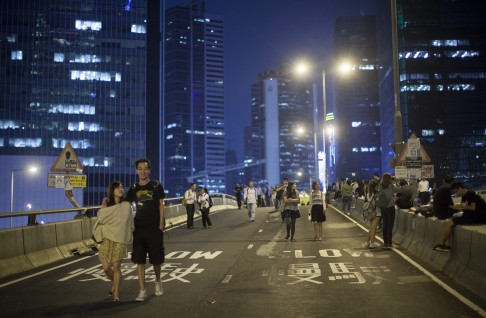
沒有留言:
張貼留言